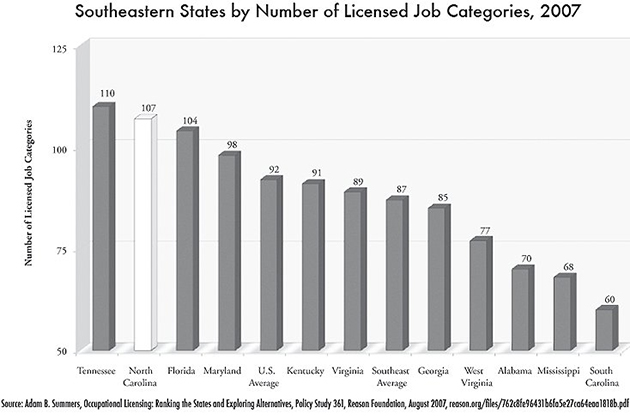Publisher's note: Agenda 2012 is the John Locke Foundation's charge to make known their wise political agenda to voters, and most especially candidates, with our twenty-eighth instalment being the "Occupational Licensing," written by Jon Sanders, Director of Regulatory Studies at the John Locke Foundation. The first installment was the "Introduction" published here.
Most people think of occupations requiring licenses as those like medicine and law. North Carolina, however, has made it state's business to certify auctioneers, barbers, librarians, manicurists, and over a hundred others. The neighboring states of Virginia, Georgia, and South Carolina are less restrictive.
Occupational licensing makes it harder and more costly for providers to enter an occupation. It leads to higher prices for licensed providers, more business for licensing programs, and revenue to the state through license fees.
Occupational licensing is supposed to protect the public from fraudulent or incompetent providers. The best available evidence, however, finds that punishing confirmed bad providers after the fact is just as effective, plus it doesn't raise consumer costs, limit job opportunities, or turn away young entrepreneurs.
Key Facts
• North Carolina licenses access to over 100 occupations and over 700 commercial activities.
• North Carolina has over 50 licensing boards. Some have very few applicants, and many cover similar territory in fields such as personal care services.
• In 2006, University of Minnesota economist Morris Kleiner estimated that occupational licensing accounted for $100 billion in lost economic output per year and transferred $300 billion per year from consumers to licensed professionals. Kleiner found no impact or even a negative impact on the quality of services provided, an exceedingly poor showing for such a huge, forced transfer of wealth.
• Most occupational licensing is favored by individuals already in the regulated industry. They are helped by restrictions and hurdles to entry faced by potential competitors on the outside.
• Almost 80 percent of medical workers are licensed, Kleiner found, making medicine the most regulated industry in terms of occupational licensing -- one reason why it's so expensive.
• Overregulation prevents, for example, nurse practitioners and physician assistants from providing routine medical care, which would expand basic care and make it less expensive.
• Teacher certification is a significant barrier to expanding state-mandated virtual schooling, blocking high-caliber out-of-state teachers, higher education faculty, private-sector professionals, private-school faculty, and independent scholars from teaching in online schools despite those schools' virtual elimination of physical limitations.
• In July 2011, African hair braiding -- a traditional skill practiced often by West African immigrants -- fell under state licensing. New entrants must spend 300 hours in cosmetology schools to gain a license. Complaints about "unlicensed" African hair braiders came not from customers but from licensed cosmetologists who resent competition.
• In 2012 the North Carolina Board of Dietetics/Nutrition threatened Steve Cooksey with jail time for unlawful practice of dietetics and nutrition. Cooksey had a web site wherein he recounted his experience with dieting in losing weight and curing his type-2 diabetes.
• In 2011, after the death of a newborn, Amy Medwin was arrested and convicted for practicing midwifery without a license. She was a licensed midwife in Virginia and had also assisted the births of the baby's siblings. She was not charged in the death of the child, who died of natural causes.
• In 2010, the Federal Trade Commission challenged the N.C. Board of Dental Examiners for its regulation against non-dentists offering teeth-whitening services. The FTC formally accused the N.C. Dental Board of "acting to suppress competition."
Recommendations
Reform North Carolina's licensing structure; abolish some licensing boards and reform and merge others to bring about more jobs and lower costs.
Allow nurse practitioners and physician assistants to provide more routine medical care.
Ease or eliminate traditional certification and licensure requirements for teachers.
Analyst: Jon Sanders
Director of Regulatory Studies
919-828-3876 •
jsanders@johnlocke.org

























